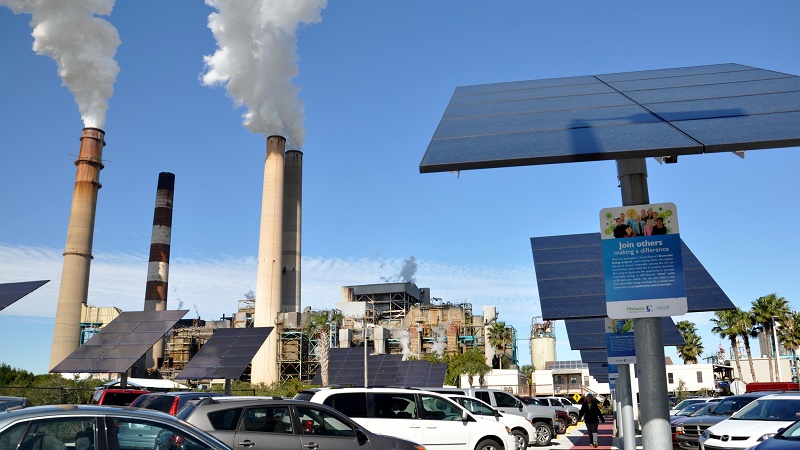A day before the Paris climate agreement is fêted into international law, the UN has issued a stark warning that political compromises have kept the world on track for disastrous global warming.
In a major annual stocktake of global action to reduce carbon – the Emissions Gap Report released on Thursday – the UN Environment Programme (UNEP) called on the leaders of the world to bring their emissions targets into line with the advice of scientists.
Under the Paris climate agreement, which comes into effect on Friday, nations agreed to limit warming “well below 2C” and strive for less than 1.5C. But the collective pledges of nations under the Paris agreement fall far shy of either goal – sending the temperature shooting up to 3.2C above pre-industrial levels by the end of the century. The warmer the world becomes, the more destructive and painful climate change will be.
The report was released a week before climate talks resume in Morocco and it is hoped the process of increasing ambition will begin.
In order to get on track, nations must cut a further 25% off their projected emissions by 2030, said UNEP head Erik Solheim: “It’s still not good enough if we are to stand a chance of avoiding serious climate change.”
Solheim added: “If we don’t start taking additional action now, beginning with the upcoming climate meeting in Marrakech, we will grieve over the avoidable human tragedy. The growing numbers of climate refugees hit by hunger, poverty, illness and conflict will be a constant reminder of our failure to deliver. The science shows that we need to move much faster.”
This report focuses on achieving a 2C limit to warming. But the Paris agreement enshrines a more ambitious target – a target the UN body said was quickly slipping beyond reach.
“Continuing on the emissions trajectory implied by the current INDCs [national climate plans] would mean that the budget for 1.5C is already overspent by 2030, and the budget for 2C is almost depleted,” the report said.
While the combined national contributions fail to reach the 2C goal, the report also found that none of the major developed economies have implemented policies that would achieve even those inadequate pledges. The one exception is Russia, which measures its pledge against a pre-Soviet collapse baseline that means it has to do nothing to meet the goal.
In the UK, laws have been passed to underwrite the government’s policy to “maximise” its oil and gas prospects in the North Sea. US protesters are engaged in a pitched battle to stop the North Dakota Access Pipeline, which they say exemplifies the gap between pledge and policy. Australia has repeatedly approved the massive Carmichael coal mine, with the Queensland state government giving the project “essential” status. In South Korea, the government has dropped its 2020 climate target in preference for a weaker 2030 one.
“Bottom line: not enough,” said UNEP chief scientist Jacqueline McGlade, although she added “there are lots of signals around the world that things are going in the right direction.”
Report: Cities rush to join climate drive after Paris Agreement
There was a brighter tone to the report when it ventured beyond the tortured progress at state level. Cities, regions, companies and civil society organisations are consistently going beyond the level of ambition set by their national overlords.
On Thursday, the Australian state of New South Wales announced a plan to reach net zero emissions by 2050. In doing so it joined with several other states to have made similar pledges. The national government has set no goals beyond 2030.
Outlining the city of London’s programmes to cut emissions, deputy mayor Shirley Rodrigues said all emitters including national governments must capture the political momentum created in Paris and translate it to real emissions cuts. “We know we can’t do this alone,” she said.
Similarly, corporations are recognising the benefits of being ahead of the climate curve with thousands making commitments to reduce their emissions. Although the report notes that accountability is a problem in the private sector.
The Nature Conservancy’s climate change director Lynn Scarlett said. “The report highlights the extent to which companies are addressing climate risks facing their businesses… Investors are going to be paying increasing attention to those risks and how companies are managing them, as well as the relationship between corporate decarbonisation and financial performance.”
Non-state initiatives could save the world several billion tonnes of CO2 by 2030, the report estimated. For reference, the US emitted around 6.8 billion tonnes in 2014. The UN report said that would make a “significant” difference to the state of the climate in 2030.
The report also highlighted the role of energy efficiency, so often the poor cousin of other carbon cutting measures. Investment in energy efficiency grew by 6% in 2015, despite being hampered by hundreds of billions of dollars in fossil fuel subsidies that reduce energy prices and undercut the economics of efficiency measures.
